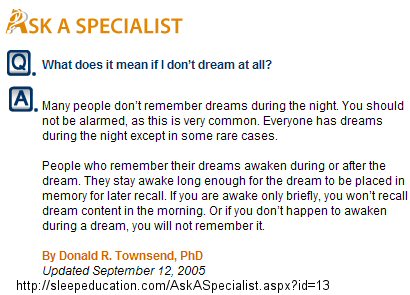Given these two things (always a scary phrase to use, since I could be oh, so wrong!)
1. Time spent in REM is at its longest during the final REM cycle before a person gets up in the morning....
and
2. Many normal sleepers probably use an alarm clock or clock radio to wake them in the morning, to get ready for work...
It doesn't surprise me at all that normal sleepers
would report remembering a dream or at least vaguely being aware they had been dreaming when they wake up in the morning. In many normal sleepers' cases, that final long REM is probably being interrupted by the alarm clock. Even if they wake up on their own, it's probably as they are coming up out of that last long REM, or even out of some wispy dreaming in light stage 1 as they are waking up in the morning.
I think it's easy to confuse:
A. "
actually dreaming" -- which people can do in normal amounts of REM without being aware of it at all.
with
B. "
remembering a dream or
remembering having dreamt" -- which indicates they had REM (or perhaps a very light stage of sleep) interrupted by an awakening.
As I understand it, the only way a person can recall a dream, or even be fuzzily aware of "I know I had a dream but the memory is so wispy, I can't recall any details at all..." is if they
wake up enough AND are awake
long enough WHILE the dream was happening, to
commit at least the fact of having just had a dream to memory even if the details are too hazy to grasp. Awake enough, and for long enough (I think I've read perhaps 15 seconds?) to commit to memory either some specific details of the dream or at least a vague remembrance of "having been dreaming."
So, when people flatly say, "I didn't dream last night." what they really mean (if they understood the difference) is, "I don't
remember dreaming."
Without being hooked up to EEG, as in a sleep lab, there's no way to really know if a person who reports "I had no dreams at all last night":
A. did not go into REM, or was bounced out of REM repeatedly by apneas -- bad.
or
B. did indeed have normal amounts of REM, but slept through it without waking up enough to be aware of dreaming -- good.
I'd think a person's statement upon waking, "I dreamed" or "I didn't dream" would be a very inaccurate indicator in most cases regarding whether they did, or did not, have normal amounts of REM.
In three consecutive nights of PSG, I did not remember a single dream or even have the vaguest awareness in the morning of having dreamed at all. Yet all three PSGs showed REM at the usual intervals and with the usual lengthening of time in REM as each night went on.
BarryKrakowMD wrote:4.Contrary Views. Having said all that I've said in 1-3, we also clearly recognize that dreaming too much,...
I hate to interrupt a quote, but I'd qualify that as "
remembering dreaming" rather than (actually) dreaming "too much." I think the distinction is that important.
BarryKrakowMD wrote: we also clearly recognize that dreaming too much, say several months after a REM rebound in the first month of PAP, could be a sign that you are waking up too much during the night and that's why you remember your dreams.
I agree.
BarryKrakowMD wrote: 5. Dream Content. It is remarkable how many patients with disturbing dreams report less nightmares once they go on PAP therapy, and many also report less overall dream awareness.
That doesn't surprise me. Regardless of dream content, I'd think if CPAP treatment provides less interruption of REM and fewer awakenings to the point of being able to
remember a dream, then yes...there would be less recollection of having had ANY kind of dream. Whether pleasant or nightmare quality.
BarryKrakowMD wrote: 6. Dreams as a Measure of REM. In sum, if you are able to use your dream behavior in a way to get the sense of how well you are consolidating REM sleep, then it will be a very useful metric in monitoring your response to PAP therapy.
Not having ANY recollection of dreaming at all is probably a much more useful metric (imho) that PAP therapy is effective, than is the actual
content of remembered dreams. A remembered dream, be it a pleasant dream or a nightmare, is an indicator of interrupted REM and/or getting bounced up into stage 1 too often, imho.
Dreams that a "normal sleeper" or an effectively PAP treated sleeper has,
but sleeps through (as they should) and is never aware of, could very well have a considerable number of terrible nightmares, imho.
If a tree falls.....
Just a layperson's opinion, though.















